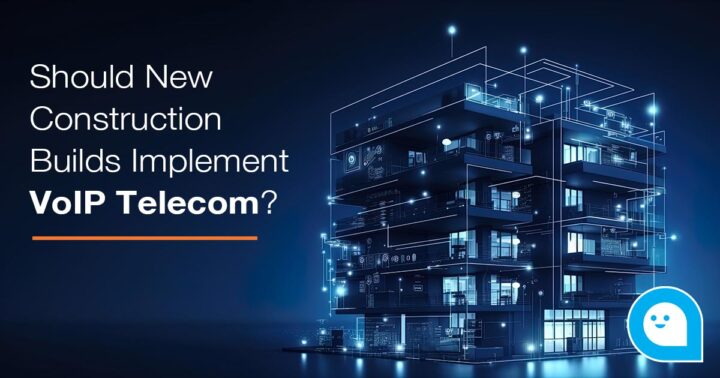Implement VoIP
Implementing a VoIP (Voice over Internet Protocol) system in new builds, such as condominiums, high-rises, and office buildings, offers several benefits that can enhance connectivity, reduce costs, and provide a modern infrastructure that meets the communication needs of residents and businesses.
Here are the top 10 key advantages of installing VoIP solutions in new builds:
- Cost-Effective Installation and Operation: VoIP systems utilize the existing internet infrastructure, which can significantly reduce the costs associated with installing traditional telephone lines. Moreover, the operational costs, including installation before closing, are generally lower, making it a cost-effective solution for both developers and occupants.
- Scalability: VoIP systems are highly scalable, allowing easy addition of lines or modifications to the system as the building’s occupancy and needs change. This flexibility is especially beneficial in new builds, where the exact demand for communication services may evolve over time.
- Enhanced Communication Features: VoIP technology offers advanced communication features that are not available with traditional phone systems, such as voicemail to email, call forwarding, video calls, and conference calls. These features can improve the communication capabilities of businesses and enhance the living experience for residents in condos and high-rises.
- Integration with Other Systems: VoIP can be integrated with other building systems, such as access control, security, and building management systems. This integration can facilitate features like video intercoms for visitor management, emergency announcements, and more efficient building operations.
- Remote Management and Flexibility: VoIP systems can be managed remotely, allowing building managers or businesses to adjust settings, add or remove services, and troubleshoot issues without needing physical access to the hardware. This flexibility is particularly advantageous for managing communications in large or multiple buildings.
- Future-Proofing: As telecommunication technology continues to evolve, VoIP systems are more adaptable to future developments compared to traditional telephony. Implementing VoIP in new builds ensures that the communication infrastructure is less likely to become obsolete, providing a longer-term investment.
- Space and Energy Efficiency: VoIP technology typically requires less physical space (especially Cloud based) than traditional telephony systems and can leverage the building’s existing data network infrastructure. This efficiency helps in optimizing space usage and can contribute to lower energy consumption.
- Enhanced Mobility and Connectivity: VoIP enables users to make and receive calls from various devices, including smartphones, tablets, and computers, offering greater mobility and connectivity within the building premises. This feature is especially useful in office buildings where employees may move around frequently.
- Sustainability: By reducing the need for copper wiring and utilizing more energy-efficient technology, VoIP systems align with green building practices and sustainability goals. This aspect can be appealing for developers and occupants who prioritize environmental considerations.
- Attractiveness to Tenants: Modern businesses and tech-savvy residents often expect advanced communication technologies. Offering VoIP in new builds can make the property more attractive to potential tenants who value such features, potentially leading to higher occupancy rates and rental yields.
Implementing ClearlyIP’s VoIP solutions in new construction projects presents a forward-thinking approach to building communications infrastructure, aligning with current technological trends and preparing the property to meet the future demands of occupants.

